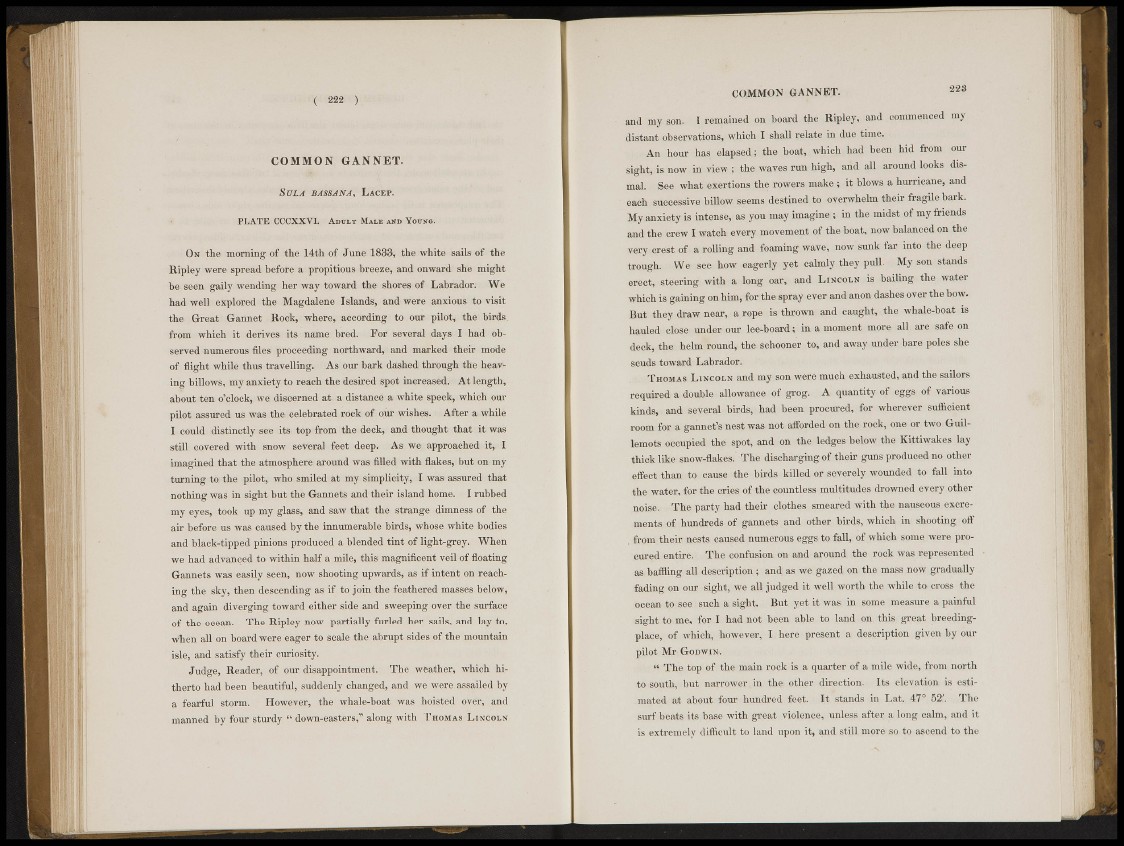
COMMON GANNET.
SULA BASSANA, LACEP.
PT.ATF, COCXXVl. A m t MALE AND Yotrss.
ON the morning of the 14th of June 1839, the white sails of the
Ripley were spread before a propitious breeze, and onward she might
be seen gaily wending her way toward the shores of Labrador; We
had well explored the Magdalene Islands, and wefe anxious to visit
the Great Gannet Rock, where, according to our pilot, the birds,
from which it derives its name bred. -¡¡For several days I had observed
numerous files proceeding northward, and marked their mode
of flight while thus travelling. As our bark dashed: through the heaving
billows, my anxiety to reach the desired spot increased. A<t length,
about ten o'clock, we discerned afc.a distance a white speck, which our
pilot assured us was the celebrated rock of ojtt wishes. After a while
I could distinctly see its- top from the deck, and thought that it was
still covered with snow several feet deep.- As we approached it, I
imagined that the atmosphere around was filled with flakes, but, on my
turning to the pilot, who smiled at my simplicity, I was assured that
nothing was in sight but the Gannets and their island home. I rubbed
my eyes, took up my glass, and saw that the strange dimness of the
air before us was caused by the innumerablfebirds, whose white bodies
and black-tipped pinions produced a blended tint of light-grey. When
we had advanced to within half a mile, this magnificent veil Of floating
Gannets was easily seen, now shooting upwards, as if intent on reaching
(he sky, then descending as if to join the feathered masses ..below,
and again diverging toward either side and sweeping over the surface
of the; ocean. The Bipley now partially furled her sails, arid lay to,
when all on board were eager to , scale the abrupt sides of the mountain
isle, and satisfy their curiosity.
Judge, Reader, of our disappointment. The weather, which hitherto
had been beautiful, suddenly changed, and we were assailed by
a fearful storm. However, the whale-boat was hoisted over, and
manned by four sturdy " down-easters," along with THOMAS LINCOLN
C O M M O N GANNET. 22S
and my so». 1 remained on board the Ripley, and commenced my
distant observations, which I shall relate in due time.
An hour has elapsed; the boat, which had been hid from our
sight, is now in view ; the waves run high, arid all around looks dismal.
See what exertions the rowers make; it blows a hurricane, and
each successive* billow seems destined to overwhelm their fragile bark.
My anxiety is: intense, as you m»y imagine ; in the midst of my friends
and the crew I watch every movement of the boat, now balanced on the
very crest s|!.a rolling and foaming wave, now sunk far into the deep
trough. We see how eagerly vet calmly.they pull My son stands
erect, steering with a long oar, and LINCOLN is; bailing the water
which is gaining on him, for the spray ever and anon dashes over the bow.
But they draw near, a rope is thrown and caught, the whale-boat is
hauled etosei under our lee-board; 1 * * moment; more all are safe on
deck, the holm round, the Schooner to, and away .under base poles she
scuds toward Labrador,
THOMAS LINCOLN and my son were much exhausted, and the sailors
required! a doublS', allowance Of grog. A quantity of eggs of various
kinds, and several .birds, had been, procured, for wherever sufficient
room for a gannefs nest was not afforded on the: rock, one or two Guillemots
occupied the spot, and on the ledges below the Kittiwakes lay
thick like snow-flakes.' The discharging of their guns produced no other
effect: than to cause the birds killed or severely wounded to fall into
the water, for the cries of the countless multitudes drowned every other
noise. The party had their clothes smeared with the nauseous excrements
of hundreds, of gannets and other birds, which in shooting off
, from thefr nests caused numerous eggs to fall, of which some were procured
entire» The confusion on and around the rook was represented
as baffling all description; and as we gazed on the mass now gradually
fading on our sight, we all jndged it well worth the while to» cross the
ocean to see such a> sight, But yet: it was in some measure a painful
sight to me,: fér I had not been, able to land on this great breedingplace,
of which, however, I, here present a description given by our
pilot Mr GODWIN.
" The top «ji the main Sock is a quarter of a mile wide, from north
to south, but narrower, in the: other direction. Its elevation is estimated
at about four hundred feet. It stands in Lat. 47° 52'. The
surf beats its, base with great violence, unless after a long calm,, and it
is extremely difficult to land upon it, and still moré so. to ascend to the